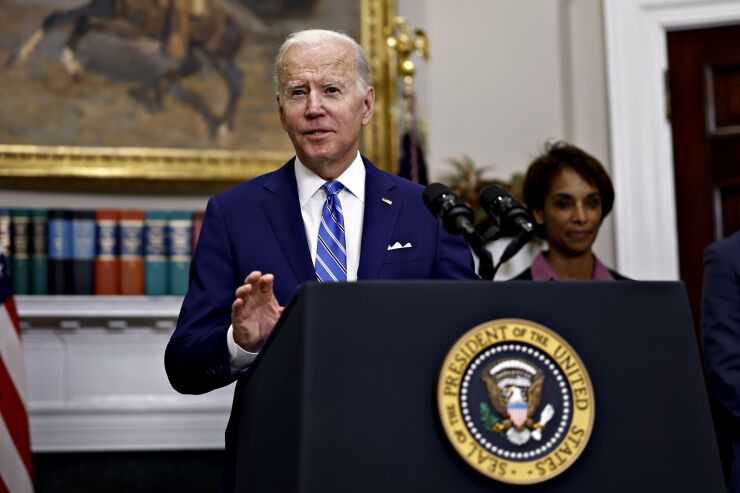Pressure is mounting for congressional leaders to respond to The Federal Emergency Management Agency's dwindling Disaster Relief Fund during an intense season that has produced hurricanes in Florida and California and long-term damage in Hawaii.
The Biden Administration's $12 billion request for funding, currently being considered alongside additional funding for the war in Ukraine, would help to replenish the Disaster Relief Fund that is according to FEMA "approaching exhaustion." But the sheer volume of disasters in this country have many thinking that leaning on FEMA as the sole provider of disaster relief won't be enough.
FEMA has instituted new spending restrictions, or "immediate needs funding," which can only be spent to address life-threatening emergencies and "other extreme weather events," FEMA administrator Deanne Criswell said. The aid restrictions do not affect FEMA's aid to individuals or payments from the agency's flood-insurance program.

Speaking to reporters last week, President Biden outlined his commitment to assist all communities in need, even if the FEMA dollars get delayed in political gridlock. "If I can't do that, I'm going to point out why," Biden said. "I'm confident – even though there's a lot of talk from some of our friends up on Capitol Hill about the costs – we're gonna do it."
But a much more complicated dynamic is developing on Capitol Hill, as disaster relief is being grouped with increased spending on Ukraine and billed as equally important in keeping the American people safe and dysfunction in the House threatens another shutdown.
"The Senate's top priority must be keeping the American people safe," Sen. Mitch McConnell, R-Ky., said on the Senate floor Tuesday. "And this month, we'll have the chance to do that with supplemental appropriations for urgent national security and disaster relief priorities."
Many lawmakers have no further interest in arming Ukraine but House Speaker Kevin McCarthy, R-Calif., has bigger issues on his hands. The Senate is expected to clear three bipartisan spending bills next week and the House Speaker plans to begin passing individual appropriations bills the week of Sept. 18, just under two weeks before federal agencies run out of money on Sept. 30, all the while he faces pressure to mount an impeachment inquiry against President Biden.
But for the muni market, the fight over disaster relief is one that may have to be increasingly dealt with by state and local governments, due to the increasing long-term effects that climate has wrought on local communities.
"The common wisdom among #muniland investors that all disaster costs will be federalized through FEMA may not hold true much longer," Triet Nguyen, vice president of strategic data operations at DPC Data said in a LinkedIn post. "Direct disaster relief is also not the only factor that will affect recoveries in affected areas. Availability of flood and property insurance, costs of adapting to higher average heat conditions etc.. will also impact the long-term viability of any community."
Nguyen believes that in the past, federal relief money has actually spurred economic growth after an accident happens but now with the size and frequency of disasters increasing, and other more long-term effects weighing on local governments, that situation will become increasingly unlikely.
In some cases, extreme weather events are already being priced in. According to research conducted by Tim Johnson, Viral Acharya, Suresh Sundaresan and Tuomas Tomunen of the University of Illinois Urbana-Champaign and presented at this year's Brookings Municipal Finance Conference, communities particularly exposed to heat stress pay more in borrowing costs in the muni market.
Following the hurricanes in California and Florida over the last few weeks, insurers are re-evaluating their exposures to geographic areas with elevated catastrophe risk, while beginning to face higher building and reinsurance costs. State Farm, Allstate and Farmers will all cease issuing new home insurance policies in California but the effects will likely extend beyond this hurricane season.
"Rising premiums and reduced availability of homeowners' property insurance could drag on housing markets, development activity, overall economic growth and ultimately tax bases for certain California and Florida local governments over time," Fitch Ratings said.
Those state and local governments that don't take the steps to protect their communities and overly rely on FEMA dollars may be increasingly scrutinized for it.
"The municipal industry is not alone in not valuing or disclosing climate risk, but as states demand federal government disaster aid and data is available to identifying the existing risks prior to a catastrophe, the question will be asked, why should federal support be provided in aid or in the subsidy (via the exemption) to those states and local governments who do not adapt (with critical infrastructure upgrades or protective measures), to the evolving risks or disclose those risks to their lenders, i.e., investors," a Municipal Market Analytics report said. "This summer has highlighted the current and future climate risks, and the municipal industry needs to evolve to capture the financing opportunities as well as to inform its participants."




